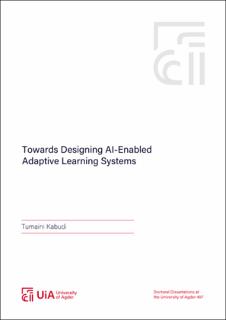| dc.contributor.author | Kabudi, Tumaini | |
| dc.date.accessioned | 2023-04-14T06:58:59Z | |
| dc.date.available | 2023-04-14T06:58:59Z | |
| dc.date.created | 2023-04-12T14:21:27Z | |
| dc.date.issued | 2023 | |
| dc.identifier.citation | Kabudi, T. (2023). Towards Designing AI-Enabled Adaptive Learning Systems [Doctoral thesis]. University of Agder. | en_US |
| dc.identifier.isbn | 978-82-8427-120-0 | |
| dc.identifier.issn | 1504-9272 | |
| dc.identifier.uri | https://hdl.handle.net/11250/3062984 | |
| dc.description | Paper I, III, IV and V are not available as a part of the dissertation due to the copyright. | en_US |
| dc.description.abstract | Among the many innovations driven by artificial intelligence (AI) are more advanced learning systems known as AI-enabled adaptive learning systems (AI-ALS). AI-ALS are platforms that adapt to the learning strategies of students by modifying the order and difficulty level of learning tasks based on the abilities of students. These systems support adaptive learning, which is the personalization of learning for students in a learning system, such that the system can deal with individual differences in aptitude. AI-ALS are gaining traction due to their ability to deliver learning content and adapt to individual student needs. While the potential and importance of such systems have been well documented, the actual implementation of AI-ALS and other AI-based learning systems in real-world teaching and learning settings has not reached the effectiveness envisaged on the level of theory. Moreover, AI-ALS lack transferable insights and codification of knowledge on their design and development. The reason for this is that many previous studies were experimental. Thus, this dissertation aims to narrow the gap between experimental research and field practice by providing practical design statements that can be implemented in effective AI-ALSs. | en_US |
| dc.language.iso | eng | en_US |
| dc.publisher | University of Agder | en_US |
| dc.relation.ispartofseries | Doctoral Dissertations at the University of Agder; no. 407 | |
| dc.relation.haspart | Paper I: Kabudi, T., Pappas, I., & Olsen, D. H. (2020). “Systematic Literature Mapping on AI-Enabled Contemporary Learning Systems”. AMCIS 2020 Proceedings. https://aisel.aisnet.org/amcis2020/is_education/is_education/4. Published version. Full-text is not available in AURA as a separate file. | en_US |
| dc.relation.haspart | Paper II: Kabudi, T., Pappas, I., & Olsen, D. H. (2021) AI-enabled adaptive learning systems: A systematic mapping of the literature. Computers and Education: Artificial Intelligence, 2. https://doi.org/10.1016/j.caeai.2021.100017. Published version. Full-text is available in AURA as a separate file: https://hdl.handle.net/11250/2992016 | |
| dc.relation.haspart | Paper III: Kabudi, T. (2022). Artificial Intelligence for Quality Education: Successes and Challenges for AI in Meeting SDG4. In: Zheng, Y., Abbott, P., Robles-Flores, J.A. (eds) Freedom and Social Inclusion in a Connected World. ICT4D 2022. IFIP Advances in Information and Communication Technology, vol 657. Springer, Cham. https://doi.org/10.1007/978-3-031-19429-0_21. Published version. Full-text is not available in AURA as a separate file. | |
| dc.relation.haspart | Paper IV: Kabudi, T. (2021). Identifying Design Principles for an AI-enabled Adaptive Learning System. In PACIS 2021 Proceedings. https://aisel.aisnet.org/pacis2021/26. Published version. Full-text is not available in AURA as a separate file. | |
| dc.relation.haspart | Paper V: Kabudi, T., Pappas, I., & Olsen, D.H. (2022). Deriving Design Principles for AI-Adaptive Learning Systems: Findings from Interviews with Experts. In The Role of Digital Technologies in Shaping the Post-Pandemic World (pp. 82–94). Springer. https://doi.org/10.1007/978-3-031-15342-6_7. Published version. Full-text is not available in AURA as a separate file. | |
| dc.rights | Attribution-NonCommercial-NoDerivatives 4.0 Internasjonal | |
| dc.rights.uri | http://creativecommons.org/licenses/by-nc-nd/4.0/deed.no | |
| dc.title | Towards Designing AI-Enabled Adaptive Learning Systems | en_US |
| dc.type | Doctoral thesis | en_US |
| dc.description.version | publishedVersion | en_US |
| dc.rights.holder | © 2023 Tumaini Kabudi | en_US |
| dc.subject.nsi | VDP::Matematikk og Naturvitenskap: 400::Informasjons- og kommunikasjonsvitenskap: 420 | en_US |
| dc.source.pagenumber | 113 | en_US |
| dc.source.issue | 407 | |
| dc.identifier.cristin | 2140318 | |

